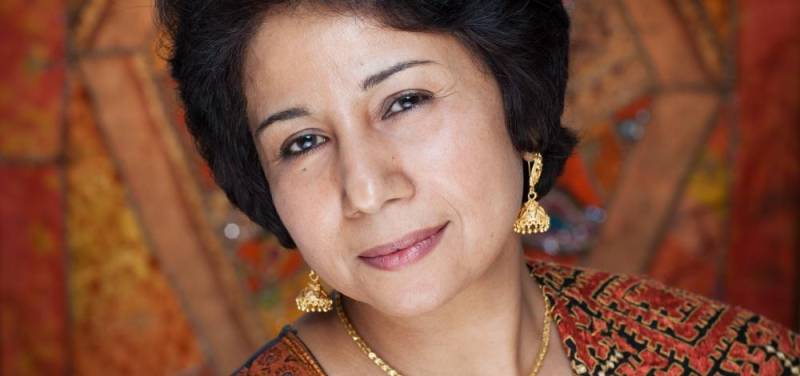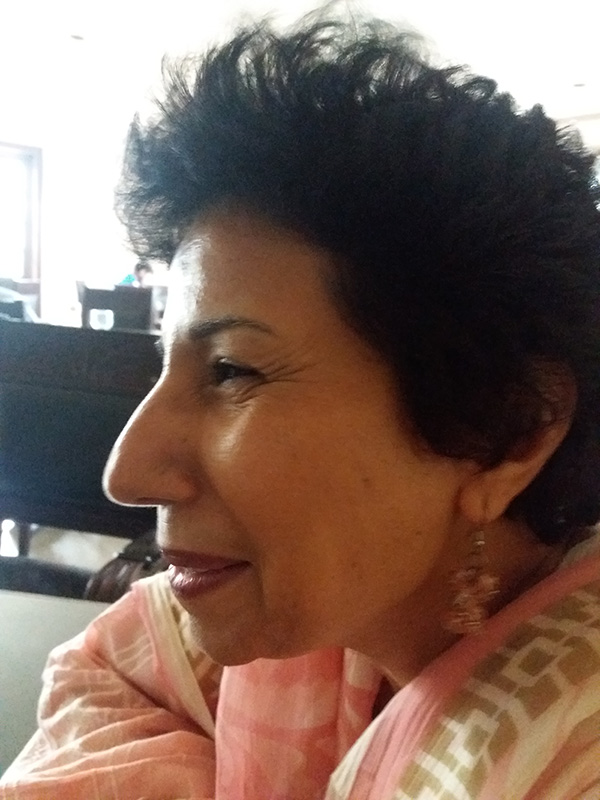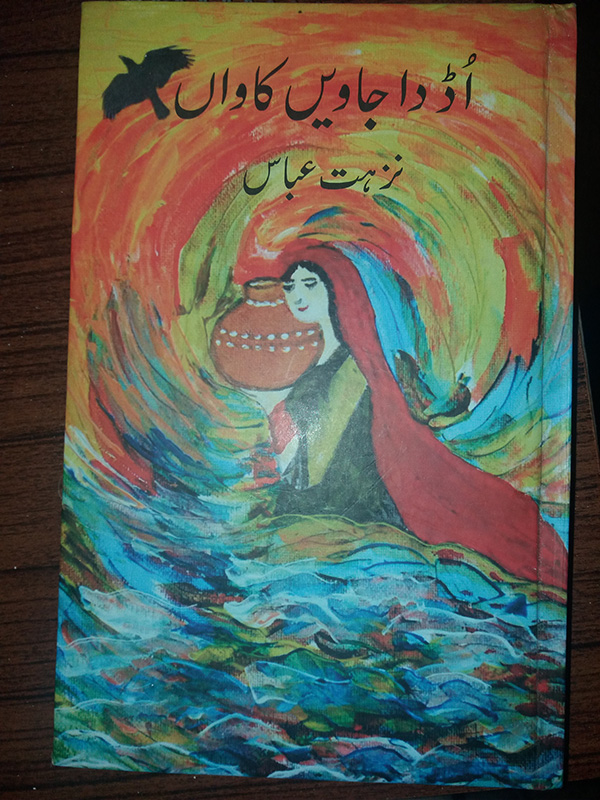
She is writer, poet, singer, educationist and social worker. Born in Faisalabad, Nuzhat Abbas can be called ‘Booti’ of Lyallpur. She was the first girl from Lyallpur to go to Soviet Union for higher studies. So she blossomed in USSR. Came back and joined ‘Oxfam’ Islamabad. She, along with her husband, shifted to UK Oxford and is now working there.
She was influenced by Marxism at a very early age while living among working class and witnessing their exploitation and struggle closely. Moreover, the untimely death of her mother had deeply affected her.
From 1985 to 1989 she studied history, philology, world literature and Russian language at Patrice Lumumba People’s Friendship University Moscow, USSR. She was inspired by Patrice Lumumba as a child.
The accident at the textile mill really impacted her way of thinking and she wrote her first poem called “mazlumon ki awazain”.

In 1995 she was selected as researcher and interviewer for Voices of Pakistani Women: three documentaries on women’s education, health and employment issues produced by Aslam Azhar for the Beijing Women Conference 1995 and funded by women and youth ministry of Pakistan.
Nuzhat Abbas is author of many books including.
She visited Faisalabad recently where she interacted with Zaman Khan. She told how and why she wrote and wrote “Maan banuney ka safar (Pregnancy Diary)”. They were blessed with a daughter, Anusha, in September 1998 and from that point she started to think about how a child’s brain worked and how, as a parent, she understood the early years of her child’s learning journey and development.

Being a Punjabi poet she threw light on the significance Lorian (lullabies) in Punjabi Literature. She was writing and singing songs to her daughter, in other words communicating with her child being completely unaware of the significance of Lorian in Punjabi Literature. Although her ‘Pregnancy Dairy’ is written in Urdu, few songs written in Punjabi were very significant in her pleasant journey of pregnancy. She noticed that the Punjabi song “Nika jia dil meri jind vichon bolda” (A tiny little heart within me beats) gave her and her child some special feelings, emotions and attachment. She felt more joy singing in Punjabi than any other language. Then she started remembering all Punjabi Lorian and stories which her mother used to sing or tell her brothers and her in their childhood. She made a list of them to share with her daughter Anusha and now other developed resources are available to share with all the children in the world.
She strongly feels that Lorian in Punjabi literature have deep roots and significantly provide us opportunity to feel safe, secure and enjoyable attachment with our mother tongue Punjabi and that is really important to feel good about ourselves, our identity and belonging.
Being a multi-lingual writer Nuzhat told she is more comfortable writing in both languages but since she is aware of great value of her mother tongue Punjabi, she feels it’s her main responsibility to address this issue and develop valuable image of Punjabi at every level.
She is very optimist about the future of Punjabi and observed that she had done some significant work and developed resources of audio CDs and books in Shahmukhi Punjabi. Families and communities who use this material are happy about it and she received very positive feedback. Although she strongly feels that Punjabi’s future is meaningful and bright even she finds it very challenging to make others realise the value of the Punjabi language and feel pride in using it. Punjabi’s bright future is related to Punjabi parents and children, she added. She feels touched and blessed when young children love listening Punjabi Lorian and ask her to sing to them again and again. In pre-school, even English children sing and love Punjabi Lorian. She believes if we Punjabis work hard and stay committed to our mother tongue Punjabi then this hope will truly rise like a sun and every dark corner will be brighter.
About her future plans
She told she was trying to document whatever she had received from life, writing her hopes, dreams and memories of childhood before Zia regime, when life was different from today. She tries to express feelings, experiences and learning from ordinary people’s lives around her. She thinks life gives us opportunity to play our important role and share our experiences with others. In this way she is trying to support readers and herself to hold on to hopes, dreams and be a student of life which teaches us to continue to struggle even when tragedies make life hard and unbearable. Life’s circumstances always change but we have to move on and carry on working on our vision and struggle for justice.
One of her interests is singing. When asked about her reaction, she said singing and poetry are extremely important to her. Writing and singing truly saved her in difficult times during her teenage when her mother passed away and she needed to manage home, take responsibility of her younger brothers and sacrificed her regular schooling. Poetry and singing reduced her isolation and helped her express her deepest grief, loneliness and joy. The song she wrote and composed on her mother’s death gradually became a supportive lullaby for her younger brothers and her.
Here is a translation of her poem from Urdu done by her:
“Hold me if you can dear friends
I leave you broken hearted
Hide this parting pain in your heart
I leave your world for the next
Call my friends and loved ones
Life has betrayed me at last
Be ready to mourn this parting
I leave you broken hearted
Parting of a mother from her children
Will leave barren this orchard of love
Adorn life with buds yet to blossom
I leave you broken hearted
Life is slipping away like sand
Leaving us empty handed
Hold on to these few moments
I leave you broken hearted
Find me in the moon and in stars
Visit me in sweet memories
Keep me alive in your vision
I leave you broken hearted
Hold me if you can my dears
She was influenced by Marxism at a very early age while living among working class and witnessing their exploitation and struggle closely. Moreover, the untimely death of her mother had deeply affected her.
From 1985 to 1989 she studied history, philology, world literature and Russian language at Patrice Lumumba People’s Friendship University Moscow, USSR. She was inspired by Patrice Lumumba as a child.
The accident at the textile mill really impacted her way of thinking and she wrote her first poem called “mazlumon ki awazain”.

In 1995 she was selected as researcher and interviewer for Voices of Pakistani Women: three documentaries on women’s education, health and employment issues produced by Aslam Azhar for the Beijing Women Conference 1995 and funded by women and youth ministry of Pakistan.
Nuzhat Abbas is author of many books including.
- “Maan bannay ka safar” journey to motherhood in Urdu (Hakayat,Lahore April, 2001)
- “Singing Together in Urdu and Punjabi” audio CD with 20 page booklet (The PEEPLE Centre Oxford, 2012)
- “Mun faqiri chashma” Punjabi poetry (Sanjh Publication Lahore, 2013)
- “Ud-da javeen kawan” Punjabi short stories (Sanjh publication,Lahore, 2015)
- “Stories and songs in Punjabi and Urdu” audio CD and booklet. (The PEEPLE Centre Oxford, 2016)
- “Sattay khairan” children’s story book in Punjabi with English translation (Lok Lehar Sahiwal, 2016)
- “Punjabi Folk Songs” audio CD (The PEEPLE Centre Oxford, 2017)
- “Jam Saqi - Chalye chalo ke wo manzil abhi nahin aai” joint authorAhmad Salim (Jumhoori publications Lahore, 2017)
She visited Faisalabad recently where she interacted with Zaman Khan. She told how and why she wrote and wrote “Maan banuney ka safar (Pregnancy Diary)”. They were blessed with a daughter, Anusha, in September 1998 and from that point she started to think about how a child’s brain worked and how, as a parent, she understood the early years of her child’s learning journey and development.

Being a Punjabi poet she threw light on the significance Lorian (lullabies) in Punjabi Literature. She was writing and singing songs to her daughter, in other words communicating with her child being completely unaware of the significance of Lorian in Punjabi Literature. Although her ‘Pregnancy Dairy’ is written in Urdu, few songs written in Punjabi were very significant in her pleasant journey of pregnancy. She noticed that the Punjabi song “Nika jia dil meri jind vichon bolda” (A tiny little heart within me beats) gave her and her child some special feelings, emotions and attachment. She felt more joy singing in Punjabi than any other language. Then she started remembering all Punjabi Lorian and stories which her mother used to sing or tell her brothers and her in their childhood. She made a list of them to share with her daughter Anusha and now other developed resources are available to share with all the children in the world.
She strongly feels that Lorian in Punjabi literature have deep roots and significantly provide us opportunity to feel safe, secure and enjoyable attachment with our mother tongue Punjabi and that is really important to feel good about ourselves, our identity and belonging.
Being a multi-lingual writer Nuzhat told she is more comfortable writing in both languages but since she is aware of great value of her mother tongue Punjabi, she feels it’s her main responsibility to address this issue and develop valuable image of Punjabi at every level.
Although she strongly feels that Punjabi’s future is meaningful and bright even she finds it very challenging to make others realise the value of the Punjabi language and feel pride in using it. Punjabi’s bright future is related to Punjabi parents and children, she added.
She is very optimist about the future of Punjabi and observed that she had done some significant work and developed resources of audio CDs and books in Shahmukhi Punjabi. Families and communities who use this material are happy about it and she received very positive feedback. Although she strongly feels that Punjabi’s future is meaningful and bright even she finds it very challenging to make others realise the value of the Punjabi language and feel pride in using it. Punjabi’s bright future is related to Punjabi parents and children, she added. She feels touched and blessed when young children love listening Punjabi Lorian and ask her to sing to them again and again. In pre-school, even English children sing and love Punjabi Lorian. She believes if we Punjabis work hard and stay committed to our mother tongue Punjabi then this hope will truly rise like a sun and every dark corner will be brighter.
About her future plans
She told she was trying to document whatever she had received from life, writing her hopes, dreams and memories of childhood before Zia regime, when life was different from today. She tries to express feelings, experiences and learning from ordinary people’s lives around her. She thinks life gives us opportunity to play our important role and share our experiences with others. In this way she is trying to support readers and herself to hold on to hopes, dreams and be a student of life which teaches us to continue to struggle even when tragedies make life hard and unbearable. Life’s circumstances always change but we have to move on and carry on working on our vision and struggle for justice.
One of her interests is singing. When asked about her reaction, she said singing and poetry are extremely important to her. Writing and singing truly saved her in difficult times during her teenage when her mother passed away and she needed to manage home, take responsibility of her younger brothers and sacrificed her regular schooling. Poetry and singing reduced her isolation and helped her express her deepest grief, loneliness and joy. The song she wrote and composed on her mother’s death gradually became a supportive lullaby for her younger brothers and her.
Here is a translation of her poem from Urdu done by her:
“Hold me if you can dear friends
I leave you broken hearted
Hide this parting pain in your heart
I leave your world for the next
Call my friends and loved ones
Life has betrayed me at last
Be ready to mourn this parting
I leave you broken hearted
Parting of a mother from her children
Will leave barren this orchard of love
Adorn life with buds yet to blossom
I leave you broken hearted
Life is slipping away like sand
Leaving us empty handed
Hold on to these few moments
I leave you broken hearted
Find me in the moon and in stars
Visit me in sweet memories
Keep me alive in your vision
I leave you broken hearted
Hold me if you can my dears
